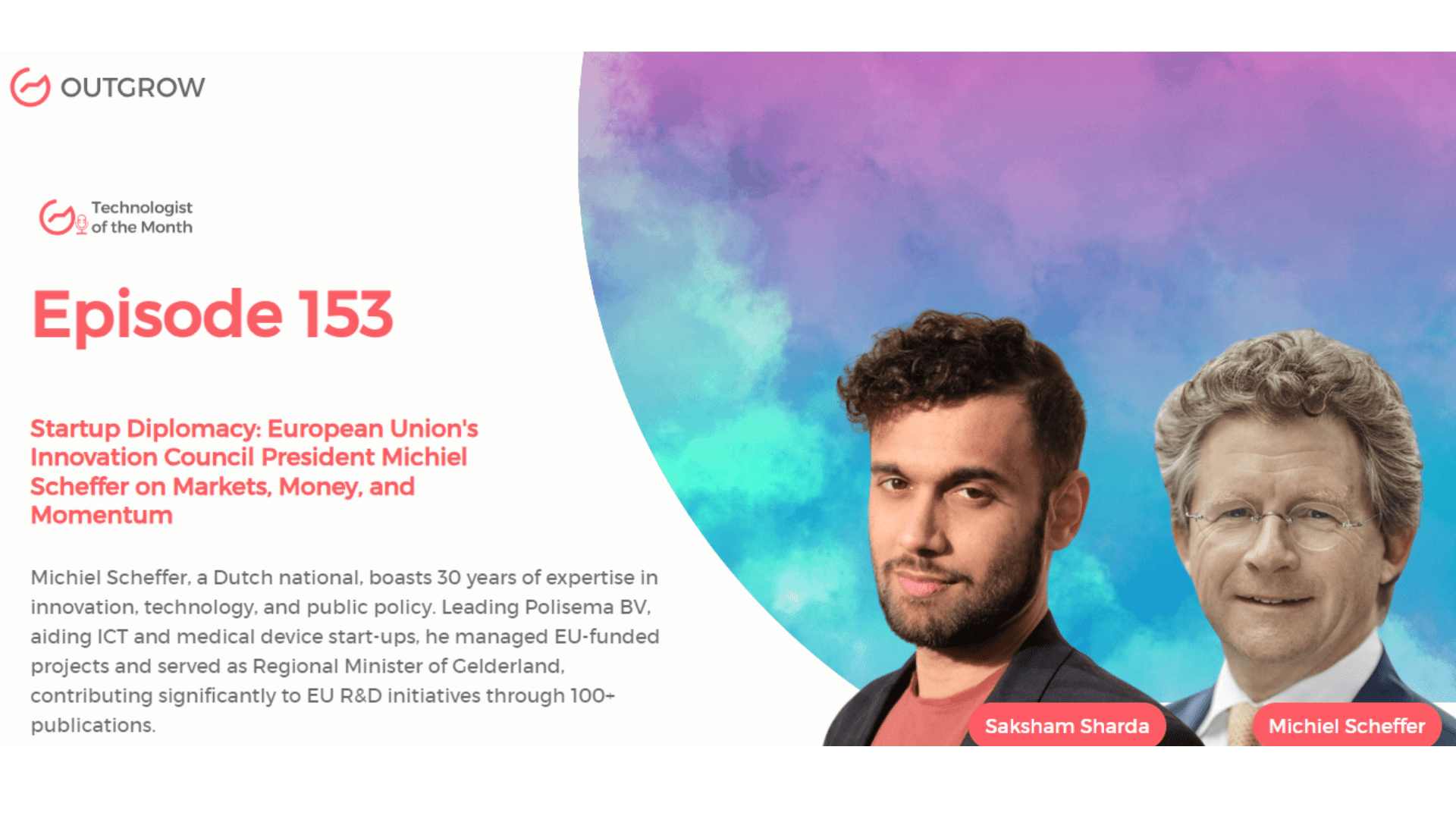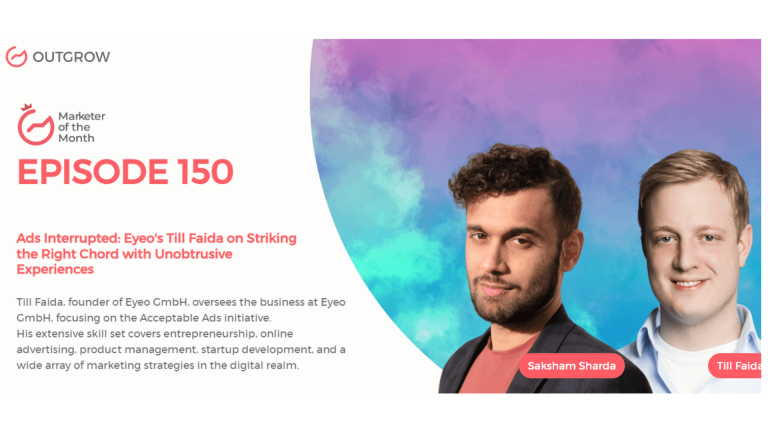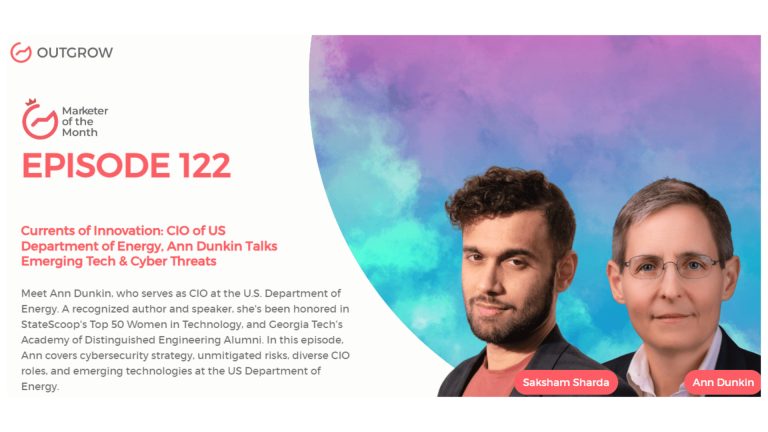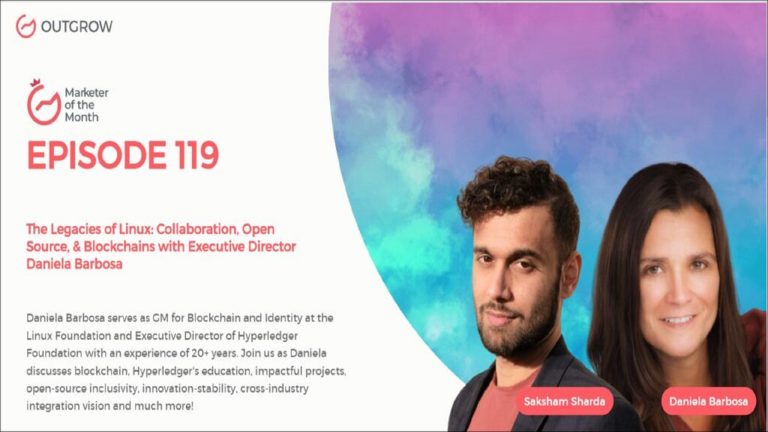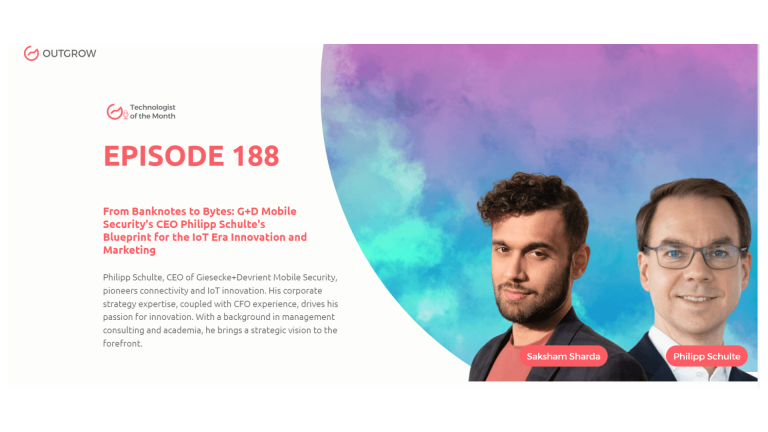EPISODE 153: Marketer of the Month Podcast with Michiel Scheffer
Table of Contents
Hey there! Welcome to the Marketer Of The Month blog!
We recently interviewed Michiel Scheffer for our monthly podcast – ‘Marketer of the Month’! We had some amazing insightful conversations with Michiel and here’s what we discussed about-
1. Financial Crisis Impact: Shift from Politics to Nurturing Startups
2. Dynamic Dutch Startup Ecosystem: Connectedness within Europe
3. European Innovation Council’s Role: Driving Innovation and Attracting Capital
4. Overcoming Startup Hurdles: Tackling Capital and Market Acceptance
5. EIC’s Green Commitment: Funding for Sustainable Startups
6. Green Tech Opposition: Recognizing and Advancing Environmental Innovation
About our host:
Dr. Saksham Sharda is the Chief Information Officer at Outgrow.co. He specializes in data collection, analysis, filtering, and transfer by means of widgets and applets. Interactive, cultural, and trending widgets designed by him have been featured on TrendHunter, Alibaba, ProductHunt, New York Marketing Association, FactoryBerlin, Digimarcon Silicon Valley, and at The European Affiliate Summit.
About our guest:
Michiel Scheffer, a Dutch national, boasts 30 years of expertise in innovation, technology, and public policy. Leading Polisema BV, aiding ICT and medical device start-ups, he managed EU-funded projects and served as Regional Minister of Gelderland, contributing significantly to EU R&D initiatives through 100+ publications.
Startup Diplomacy: European Union’s Innovation Council President Michiel Scheffer on Markets, Money, and Momentum
The Intro!
Saksham Sharda: Hi, everyone. Welcome to another episode of Outgrow’s Marketer of the Month. I’m your host, Dr. Saksham Sharda, and I’m the creative director at Outgrow. co. And for this month we are going to interview Michiel Scheffer who is the President of The European Innovation Council, European Commission.
Michel Scheffer: Great to be here. Thank you.
Don’t have time to read? No problem, just watch the Podcast!
Or you can just listen to it on Spotify!
The Rapid Fire Round!
Saksham Sharda: So let’s start with the rapid-fire round. The first question is, at what age do you want to retire?
Michiel Scheffer: 72.
Saksham Sharda: How long does it take you to get ready in the mornings?
Michiel Scheffer: 20 minutes.
Saksham Sharda: Most embarrassing moment of your life.
Michiel Scheffer: I can’t remember.
Saksham Sharda: Favorite color.
Michiel Scheffer: Blue.
Saksham Sharda: What time of day are you most inspired?
Michiel Scheffer: 3 p.m.
Saksham Sharda: How many hours of sleep can you survive on?
Michiel Scheffer: Six.
Saksham Sharda: Fill in the blank. An upcoming marketing trend is ____.
Michiel Scheffer: Biopolymers.
Saksham Sharda: The city in which the best kiss of your life happened.
Michiel Scheffer: Malaga.
Saksham Sharda: Pick one- Mark Zuckerberg or Elon Musk.
Michiel Scheffer: Mark Zuckerberg.
Saksham Sharda: The biggest mistake of your career?
Michiel Scheffer: I can’t remember.
Saksham Sharda: How do you relax?
Michiel Scheffer: Cycling.
Saksham Sharda: How many cups of coffee do you drink per day?
Michiel Scheffer: Four.
Saksham Sharda: A habit of yours that you hate?
Michiel Scheffer: That’s a tough one. I think scratching my head.
Saksham Sharda: The most valuable skill you’ve learned in life.
Michiel Scheffer: Patience.
Saksham Sharda: Your favorite Netflix show.
Michiel Scheffer: Asper.
Saksham Sharda: A morning routine. Are you an early riser or a night owl?
Michiel Scheffer: I’m an early riser.
Saksham Sharda: One-word description of your leadership style?
Michiel Scheffer: Open.
Saksham Sharda: The top priority in your daily schedule?
Michiel Scheffer: Reading the newspapers.
Saksham Sharda: Ideal vacation spot?
Michiel Scheffer: Italy.
Saksham Sharda: The key factor for maintaining a work-life balance.
Michiel Scheffer: Taking time to relax and cycle.
Saksham Sharda: Memorable career milestone?
Michiel Scheffer: My PhD.
Saksham Sharda: A recent business innovation that caught your attention?
Michiel Scheffer: I like this. Well, you can pay with your phone.
Saksham Sharda: The last song you’ve been listening to?
Michiel Scheffer: There was a Fado song by Carlos do carmo.
Saksham Sharda: And the last movie that you liked?
Michiel Scheffer: Past Lives.
The Big Questions!
Saksham Sharda: Alright, well that’s the end of the rapid-fire round. Now we can go onto the long Question which you can answer with as much ease and time as you like. Can you share more about your journey from earning a Ph.D. in economic geography to your role as the president of the board of the European Innovation Council?
Michiel Scheffer: Well, the journey you describe as a journey from PhD to president of the European Innovation Council is a journey of 31 years, so it’s quite a long one. And of course, when I started 31 years ago, I had no idea that it would end here. However a thread in my career started earlier, so halfway through my university studies, I’ve always been interested in innovation and I’ve always been interested, interested in innovation in manufacturing. So I like factories, I like places where things are made, and I like the way innovation happens in factories. So I worked after my PhD for an industry association. Then I set up a technology division within the association, which I privatized in 2000, and set up my own company applying for managing European projects. So I built a lot of consuls.
Michiel Scheffer: Applied for a lot of funding and was successful. One-third of the time and not successful two-thirds of the time. And I also became a regional minister and that was an important step to the current work position because there I learned how to design policies, manage policies, and explain them to citizens, voters, entrepreneurs. That was a very good training school and afterwards would also help me to evaluate proposals a lot. So over the last four years before becoming president, I evaluated something like 50 proposals. So basically I’ve learned all the elements that are required from our current function in my CV over the last 30 years and always in the European context.
Saksham Sharda: So when you look back at it, what specific experience influenced your move from academia to a position of leadership in innovation?
Michiel Scheffer: I’m from an entrepreneurial family. My father was a CEO. My grandfather was CEO. So I’m used to being surrounded by people who are trained to make decisions and I think I was a bit awkward academically because I was more interested in knowing things for deciding but not knowing things for knowledge’s sake. So I’ve always had a kind of, let’s say CEO mentality. I’m the oldest kid, and grandchildren and so on. So I have to manage my cousins and nieces as well. So it was an important one. But what was the size of being chairman of a program committee? So I wrote an election manifesto for my party at the end of the nineties. I chose to be a candidate for the regional parliament because I wanted to use the capital of the province much better. We had 4.4 billion euros in the bank as a region. And in the middle of the financial crisis of 2008, 2012. My manifesto was to invest that money in startups and that was really what led to his position.
Saksham Sharda: Alright, so what do you think the state of the Dutch startup scene is now?
Michiel Scheffer: Well, the Dutch is a rather vibrant one, and that’s also something we see in our instruments, the pathfinder and the accelerator of the IC. And so the score, second, third position in Europe, which for a small country is quite good. And that is because with a lot of people, I’m one of them, but there are at least 25 people more than I’ve been working on, on really building a regional and a national ecosystem. Principles sometimes have been very important on a national level. I feel like a very successful CEO of investors now. So we have a comprehensive system from universities that promotes spin-offs and startups to let’s say funding instruments that help do that. So it’s very vibrant, but it is only vibrant because it is also connected to Europe. So the success key for any region in Europe is to have a strong ecosystem in the region and to connect across Europe.
Saksham Sharda: In what way is the European Innovation Council facilitating that?
Michiel Scheffer: Well, it’s a huge innovation. It’s an instrument designed by the past commissioner Carlos Manuel, who now is mayor of Lisbon and he had a vision that we had to transfer innovation to deployment or innovation to real entrepreneurship. So he modified several instruments to create the logic of the Pathfinder transition and accelerator, basically to create a range of instruments in the universal journey that brings them from the lab to market deployment to industrialization. That’s where we will announce the figures tomorrow, the 15th of November. By now it is becoming one of the largest deep tech funds in the world. And that was needed because we need to incentivize private capital to step in. They were not stepping in on their own. We now have an instrument that invites VCs, private equity, and family funds to join our mission.
Saksham Sharda: So what does your typical day at the EIC look like?
Michiel Scheffer: Well, a typical day is a day that I leave Brussels, that I go to member states to a country. I normally spend an afternoon with beneficiaries and applicants who are disappointed. So they were not selected to understand their journey. So why were they successful in applying? What did we encounter after having applied? And I also spoke to those who were disappointed to see how they could learn from that is what my typical visit is in an afternoon. And then the morning after visiting some beneficiaries.
Saksham Sharda: Is there an interesting story you have to tell about one of the people who had not selected a program that was not selected for funding or is that confidential?
Michiel Scheffer: Well, that’s confidential, but what typically you see is that you have, let’s say those who are not funded are either those who are too far already. So they have already managed all the technological risks and they only need funding for the market deployment. And that’s something we don’t fund. We found earlier when there are still 3 or 4, 5, 6, or 7 years ahead of technological development, clinical tests, for example, scaling apps to have a pilot facility. So one is they are too far and also very important is we have a moving definition of what deep tech is. So it’s not something that is fixed for 10 years. But basically with technology developing, sometimes technology becomes generalized. For example, apps for payments are no longer an automatic innovation by now. So that is what we don’t fund either. What is sorry and this is a warning at the end of the accelerator application, you have an interview. And what I am sorry to see is that some applicants don’t train for hours. You have to train it for hours and ask people to test you with a mock interview with questions with any questions. Because that’s, if you don’t train as well, you have only one half an hour to defend your project. If you lose that because you’re not well trained, that’s a pity to spend time on that for at least two days.
Saksham Sharda: Could you share an example of a specific project that embodies the core mission of the European Innovation Council?
Michiel Scheffer: A project I like a lot is a company called Fibertech and Warsaw. It’s interesting because there is Warsaw, so it’s not, let’s say in the usual suspect city and what they make is made from plant rests. They make fibrous, they extract fibrous metal and from the fibrous metal, they can make a wide range of products. They now have a wonderful small pilot factory in the east of Warsaw. And they have the mindset, the entrepreneurship to scale up. So I hope to visit them in five years and see a factory somewhere in the east of Poland, in the countryside where you have a lot of agriculture. That’s what we do, what we like to do because we have to be fossil-free in materials in 2050. So we do not need technologies like fiber tech to get there.
Saksham Sharda: So in this dedication that you have for scaling up innovation, what challenges do you foresee and how do you plan to address them?
Michiel Scheffer: Well, the big challenge that you have if you want to scale up as a startup, is you have a big capital expenditure ahead of you a big CapEx. So the biggest challenge now is that we have money to invest in companies up to Seventeen and a half million euros, and some investments are much larger than needed. So we hope to develop in the future, either in the step plan or in FP 10, so after 2027, a follow-up investment fund so that we can also offer large tickets for companies that have to industrialize. That’s an important barrier. The second one, of course, you need to get market acceptance. If you come up with new technologies, whether they’re in health, materials energy, or mobility you need to get traction from the markets. So we need to connect our startups to corporations that have had a critical mass to develop technologies and also to be more active in promoting innovative public procurement. Right? So governments can also be lead clients for new technology and they should be lead clients for technologies.
Saksham Sharda: So could you share an example where overcoming a specific challenge led to success in scaling innovation?
Michiel Scheffer: A good example is a company in France that has developed a technique with biopolymers, again to replace breasts after a breast cancer operation. We should imagine that a lot of women get breast cancer before they’re 50 so they’re still in a very active stage of life. Recovering from cancer is an important challenge. And I also think about ignition to help them. And they’ve developed a breast implant, made biopolymers. And the first challenge I had to meet, of course, was to develop the product in the way that it works. And now they’re in the clinical test stage on women who are courageous and have the trust to try that technology. What is interesting as well is what he did is not only they’re developing this breast implant technology which is very meaningful. They also have a derivative with the same materials to heal very deep wounds. So think of people with deep cuts from damage from guns and grenades in a war situation. So to repair the body tissue, let’s say underneath the skin. So what is clever with them is that they have found, let’s say, the army as a client but they have, let’s say short-term success, in the wound management process, and they have long-term success ahead of them in the breast implants. So it’s an interesting and clever combination of technologies, societal needs, and well, having a good roadmap.
Saksham Sharda: So speaking of short-term and long-term, how do you balance short-term impact and long-term sustainability in prioritizing goals and initiatives?
Michiel Scheffer: As an EIC or as a European Union, we are only for the long term because speed is not our greatest strength, sustainability is, and also endurance. And so we have funding programs that last seven years. So we are patient, we are thorough, and we also offer patient and thorough capital. So we are really in it for the long term. So I’m mainly looking at the societal impact we achieve. And we have days of celebration because we sometimes have unicorns, but that’s a side effect. We do it to improve the quality of life in Europe.
Saksham Sharda: So in your various roles, you’ve been involved in public affairs, coaching startups, and chairing commissions. How do you balance these responsibilities and how does each role contribute to your overall mission?
Michiel Scheffer: Well, I now have only one mission and one line in my CV. I’m president of the European Innovation Council’s Board and I don’t have other activities. So all my experience of coaching, being an entrepreneur, being an academic, and being a politician comes in this single function and they all have helped me to shape who I am. So, I know what it is to apply for funding. Because I’ve written more than 50 applications. I know how disappointing it is to be disappointed. I know how I know how it is to be happy to have funding and to set up a project. I know how to run it. So, I also know how to develop policies and, and evaluate. So, the nice thing about my job is I know how all the bricks and the bricks of the wall work.
Saksham Sharda: Do you ever miss academia?
Michiel Scheffer: Yes. So I’m going to write a book when I finish the job.
Saksham Sharda: When would that be?
Michiel Scheffer: I hope that will be in 2027 Or 2031.
Saksham Sharda: Okay, so let’s talk a bit about sustainability now with a focus on a sustainable planet. How does the European Innovation Council approach innovations contributing to environmental sustainability?
Michiel Scheffer: Well, we have a mission of funding startups and projects that contribute to what we call the Green Deal. The Green Deal is a range of programs or ambitions focusing on green energy, green materials, and green agriculture. So we have a sizable portfolio of companies in those three areas and what we also do is that we create communities around them. So we have program managers and the program managers bring together all the beneficiaries to create a community, and we also connect those two larger corporations to these corporation days, the corporate days where companies can submit challenges and our beneficiaries have solutions for them. So that’s the second instrument. The third instrument of course is to show through these companies what technology and innovation can do and what our new generation of entrepreneurs create, let’s say a new generation of companies that have those challenges in their hearts and their minds.
Saksham Sharda: Do you have any opinion about the backlash Green Tech is facing from European politics in some countries?
Michiel Scheffer: Well, in many countries there’s a backlash. And I’m afraid that the majority of people are not yet sensitive to the challenges. So they will vote for parties that are slowing down, postponing sometimes even ignoring or even rejecting that there is an issue. That’s a pity. However, on the other hand, instruments often have a long-term lifetime. So we go on, but it’s not an easy context to work in, especially not for the startups themselves.
Saksham Sharda: So what specific criteria does the council evaluate when supporting innovations aligned with environmental sustainability?
Michiel Scheffer: The impact is an important one. And what is the potential impact? And impact is on the technology itself but also is the team able to deliver? And so are the skills on board commercial, technological, financial, and organizational, is the team diverse? Those are important elements that we look at. So we have a kind of SDGs as an overall set of criteria to evaluate proposals.
Saksham Sharda: Do you think there’s a lack of awareness amongst the general population about where innovation is headed? It’s going to take too much time, it’s going to cost too much money. Is that why there’s a backlash against it?
Michiel Scheffer: Well, the backlash is more against technologies that are already there windmills, and solar panels in the landscape. Electric cars, they’ve been around now for some years, and it’s very polarized. There is a group of people who are very enthusiastic about it, and there’s a group who’s, who are against it, mainly because they’re afraid of the side effects or of the cost of it. New technologies are always expensive in the beginning, and once more people use them they get cheaper. Solar panels on the roof nowadays are the price of a family holiday that’s affordable for money now. It’s kind of the opposite. But on the other hand, the figures are going up. So more and more people put solar panels on the roof. People are reducing their meat consumption. People are more careful when planning flights or long-term journeys. So I think there is a general change in behavior on one side, but adopting behavior could be different.
Saksham Sharda: So does the EIC plan to address this in some way by creating awareness or some marketing or PR around it?
Michiel Scheffer: Well, we are part of the European Commission as a whole. So, the promotion of the objectives of the Commission of the European Union is well-catered by the commission in general. Our work is just to show that startups can deliver and that we can help those startups to deliver.
Saksham Sharda: Okay. So let’s pivot a little, and maybe we can talk about how innovators can make their proposals stand out in the competitive landscape of innovation funding.
Michiel Scheffer: Well, let’s go to the technique first. So it’s a three-step approach. First, it is to submit a pitch, a relatively short PowerPoint, and a video. And the main objective they use. So basically to show the value that there is a compelling case in terms of technology and terms of impact, I think the technology and the impact are core in this first stage. If you succeed in the first stage well, which is not a majority of submitters, then you are invited to write a full proposal. And the full proposal is fifty to a hundred pages. And the key element in the proposal there is again, to confirm your impact and your technology with several key data. Demonstrate that you have a patent, demonstrate that you know what a market is, and possibly ask where you will find the market. But the most essential in the proposal is the quality of the business plan so that you have a good prediction of your expenditures and revenues that you expect, of your capital requirements. So the business plan is essential. And also, of course, the team you do that with, that’s the second stage. So that’s a very thorough stage for which I always recommend people to take their time, and have other people reading it submit to critical review of people that they know. So that’s a very important stage because that’s the most critical in terms of success rate. And if you’re successful, then you go to the interview. An interview is really for the experts to feel that the team stands. So, the team should be well prepared, as I said, to train for that interview. It should show that the team knows what the others in the team say and that’s basically to convince by creating trust. So it’s deduction, conviction, and trust. Those three elements are essential in writing the proposal.
Saksham Sharda: So what advice would you give regarding balancing groundbreaking ideas with the council’s strategic priorities?
Michiel Scheffer: Well, it’s very simple if a proposal’s not within the strategic priorities, it won’t be funded. And so that is not something to take lightly. So read those texts very carefully and those texts are essential. Whether you’re applying to an open program or a challenge, you should adhere very closely to it and then of course, the second is that you understand your technological field. So we fund deep tech startups. So often people have been working since their master’s thesis in the area. So they have a master’s thesis, PhD, some postdoc, or experience in the company. They often have five to 10 years of working experience in the area. They know their field. So you should know your field, you should know what you bring, what the competitors have brought or are bringing, and how you distinguish yourself from them. And at the same time, it also helps to be connected to them and not be on your own but to be part of an ecosystem. So think all those things well through, we see too many applicants who apply early, so they haven’t worked well, in their ecosystem, and they should have worked a year or two years longer, and have better contact with possible clients and possible supplies. So patience and endurance are important.
Saksham Sharda: So looking ahead then, what trends do you foresee in innovation and how is the EIC preparing for them?
Michiel Scheffer: Well, the big buzz is artificial intelligence. And that’s rather new in the debate. I’m sometimes a bit cynical because AI is advanced statistics. So I had it at university 40 years ago, but not with the same ICT power that we have now. The ability to analyze huge amounts of data is new. And what is interesting is not AI on its own, but AI to understand, manufacturing processes to step improve the productivity of manufacturing processes. Both that’s in terms of what the client needs and being customizing as much as possible and not making stuff no one wants, but also in the process itself to use in the most efficient way resources to get a certain product or process made, that’s important. And also what is important is to speed up or improve processes and to improve understanding. For example, there is a recent beneficiary. They use AI to analyze all kinds of radiographic or other imaging of the lungs to speed up the operation of the lungs. So now it takes 15 minutes with a team of four to analyze the results of AI to determine a scenario for an operation. Whereas before it would’ve been two hours meeting with eight people to decide that. So in health, it’s very important to improve the quality of interventions, but also the efficiency of interventions and AI can make a huge contribution to that. And the last one that’s my dream is where you have, let’s say, natural behavior. Natural behavior can best be characterized by quantum computing. So imagine understanding better how pharmaceuticals work in bodies or how polymers are generated. You need a combination of quantum computing for let’s say the mass calculation possibility AI as software, backbone, and then apply to materials or chemistry and body. If we can combine those three, we have a wonderful crossover that can do a lot for sustainability.
Saksham Sharda: So the last question for you is of a personal kind. What would you be doing in your life, if not this?
Michiel Scheffer: If I was not doing this, I was doing what I was doing until April. Mainly, evaluating proposals and chairing boards. I was chairman of the vocational trading board in the Netherlands. So evaluating and setting up valuation systems to go to innovative proposals, I think that would’ve been the main one. And I also like to train people to submit good proposals. So that’s what I will do if not this. And I think I will do that after, starting with this challenge four or eight years from now.
Let’s Conclude!
Saksham Sharda: Thanks, everyone for joining us for this month’s episode of Outgrow’s Marketer of the Month. That was Michiel Scheffer who is the President of The European Innovation Council, European Commission.
Michel Scheffer: Pleasure. Thanks for having me.
Saksham Sharda: Check out the website for more details and we’ll see you once again next month with another marketer of the month.

Muskan is a Marketing Analyst at Outgrow. She is working on multiple areas of marketing. On her days off though, she loves exploring new cafes, drinking coffee, and catching up with friends.

